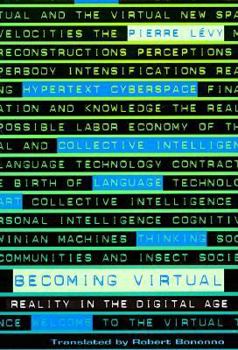Becoming Virtual
Select Format
Select Condition 
Book Overview
Virtual reality is a phenomenon that captivates people of all ages and all levels of technical expertise. It appears on the Internet and in computer games, and is used, among other places, in... This description may be from another edition of this product.
Format:Hardcover
Language:English
ISBN:0306457881
ISBN13:9780306457883
Release Date:March 1998
Publisher:Basic Books
Length:207 Pages
Weight:1.00 lbs.
Dimensions:0.9" x 6.3" x 9.3"
Customer Reviews
3 ratings
Top Mind, See His Other Two Books
Published by Thriftbooks.com User , 17 years ago
Pierre Levy writes in French (or at least he did with his first three books) and stuff may be lost in translation. I have met him, he is one of the top minds in the emerging field of Collective Intelligence, and I recommend his other two books. The other reviews are great. Collective Intelligence: Mankind's Emerging World in Cyberspace Cyberculture (Electronic Mediations Series)
A Must-Read
Published by Thriftbooks.com User , 23 years ago
The word 'virtual' has had a fair amount of exercise in the last few decades, and it would be a pity if some were put off reading this wonderful book due to the misguided belief it may be populated with computer lingo and people with wetware engaged in simulated 'virtual' sex. Levy's understanding of the virtual extends far beyond information technology; he gives the concept a proper philosophical and even anthropological foundation, and even goes so far as to show that we have in fact always been virtual, and this is what has made us human.Technology is probably what separates us from all other living creatures, or at least sophisticated technology, such as machines. Yes, other organisms utilise simple tools and what have you, but none of them are going to the moon in any sort of hurry. Levy's work is essentially about artifacts, be they software like language or symbols, or hardware like tools and machines. However, following on from the work of philosophers such as Deleuze and Serres, Levy is profoundly against the two common (mis)conceptions about them: that they 'dominate' us, or that they are simple tools in our hands, doing our bidding. Heidegger and his ilk were very keen on the domination idea, but that's only because they didn't really understand machines; sure, your VCR will seem to dominate you, if you can't work it, as many older people will tell you, but after a good dose of swearing and fumbling the usual result is a machine that just sits there doing nothing. Hardly despotism. Or you may have its measure, and say it's just a tool for capturing video images, for whatever purpose, and yet it changes the way you watch TV, capture memories of your kids, and the entire institutional set-up of the film industry. Quite a clever tool, that.If you read this book (and you should), Levy will tell you that all artifacts, including less 'material' ones like language, virtualise our lives. That doesn't mean making them less real, the common usage of 'virtual'; it means problematising them, opening them up to possibilities. Making them MORE real. And this isn't naive techno-optimism, because not only are not all these possibilities not nice, but when you virtualise something you take on-board the requirements of the virtualising medium, which have to be met to keep it running, and you become entwined with the other people associated with these artifacts, such as video repair men. Technology can truly make you feel like a god, but it always needs to be fixed, and you have to undertake profound social relationships for it to happen at all (nobody builds an aircraft carrier alone in their backyard). Or take our oldest and most 'simple' artifact: language. Language, says Levy, virtualises 'real-time', by which he means our everyday interactions with other people. That's what it means to 'discuss' something, you take an immediate issue confronting two or more people, and you use language to open it up to different resolution paths which aren't immedi
Lévy gives us a new way of seeing culture.
Published by Thriftbooks.com User , 26 years ago
This is one of those rare books that will re-wire many minds. Lévy gives us a new way of seeing culture. He achieves this by linking specific cultural activities, and thereby humankind, to a fundamental process that is outside place and time - the process of virtualisation. That the book produces its profound cognitive effect in so few words is stunning. Part of the credit for this feat must go to the translator, Bononno.'Becoming Virtual' in my view surpasses that other classic,'Understanding Computers and Cognition' by Winograd and Flores. Lévy depicts cognition and action as both social process, and process occurring within the individual. He introduces concepts sparingly and tellingly, illustrating them with examples reaching from the dawn of the human era to the present day. A book that can be read at one sitting, but will demand to be picked up again many, many times in the years ahead.





